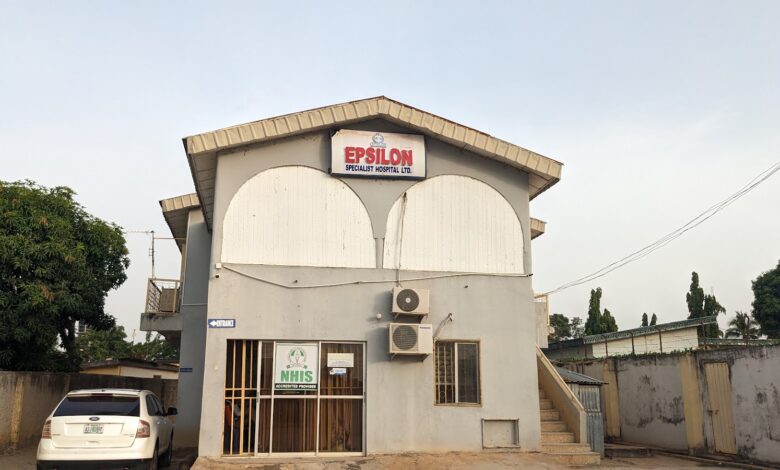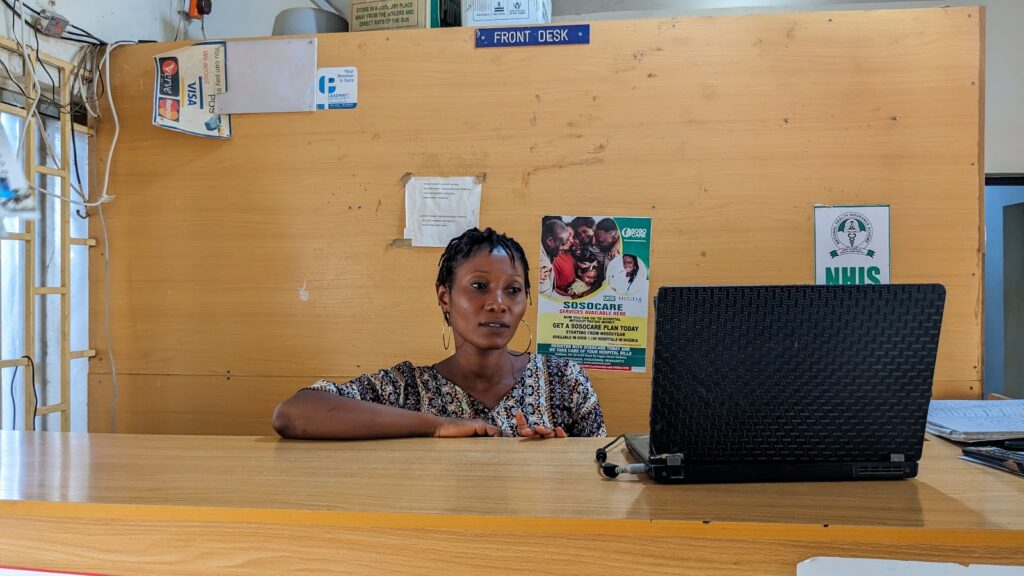The Increase In Electricity Tariffs In Nigeria Is Affecting Healthcare
The recent increase in electricity tariffs in Nigeria has affected businesses and private life. However, one of the biggest sectors being impacted is the healthcare sector, which is currently experiencing a shift in how hospitals operate in the country.

On May 18, Hikmat’llah Oni walked into an ear care centre after battling pain in her throat for a couple of days.
On getting there, she learned that the hospital card, which previously cost her ₦1000, was now ₦1500. As someone battling a chronic health condition, she wonders what that will mean for her life as a patient.
But the hospital card wasn’t the only thing that saw an increase in price at the National Ear Care Centre in North West Nigeria. According to Dr Mary Dafie Kakamor, a 33-year-old doctor working there, the Ear, Nose, and Throat (ENT) surgeons’ card has also seen a similar increase, with the cost of removing foreign bodies in the ears and nose, which used to cost around ₦2000-₦2500 last year, now going for ₦4000 – ₦4500. Both hospitals she works in are under the Band A electricity category.
On April 3, the Nigerian Electricity Regulatory Commission (NERC) announced an increase to ₦225 naira per kilowatt hour from ₦68 for areas falling under Band A. Band A feeders who are expected to get an average of 20 hours of electricity supply daily are said to represent 15 per cent of the population.
Nigeria has five electricity tariff bands, named with letters A—E. The country used to have over 1,000 feeders under Band A, which includes businesses, companies, and households; however, only 481 feeders are currently considered to be under Band A.
“Since this elitism – I call it elitism because there is no point in giving few people electricity because they can pay more and denying the same basic amenities to others – things have been chaotic because when it comes to buying electricity, especially in the private facility where I work, it has been ridiculously expensive. Units worth ₦30,000 only last for three days, which sums up to like ₦70,000 in a week and ₦280,000 in a month.”
The profits hospitals realise at the end of the month aren’t much.
“How many families can afford that? Even before the increase, there were instances where patients would come and beg you for a discount after writing a procedure or prescription for them, not understanding that you do not have a say and cannot assist in subsidising the cost for them.”
In the private hospital where she works, Multiclinic Hospital, a consultation with a doctor used to cost patients ₦7500, and one with the medical director cost ₦10,000. Now, they cost ₦10,000 and ₦15,000 respectively.
Additionally, the facility is deliberating doubling the ward fees.
Dr Mary worries that this could drive people to seek help in the lowest places they can afford, such as unauthorised chemists.
“And most of these chemists do not know what they are doing. It’s a different thing to meet a pharmacist who can guide you. Some people just open shops and start selling medication. Instead of looking for a lasting solution, the government are using plaster to cover a wound that is very large,” she said.
Patient absconds after procedure
When Dr Danjuma Saleh started operating Epson Specialist Hospital around eight months ago, things were very different.
“In the past, we could use ₦50,000 worth of electricity for 30 days, but now it lasts only six days. The implication is that we end up spending around ₦250,000 every month in order to serve our patients. A lot of our machines, such as the ultrasound machines, ventilators, lab, theatres, etc., run on electricity.”
The hospital gets up to 20 hours of electricity a day. To make things easier, they have recently developed a system where they use solar alongside the electricity, which allows ₦50,000 worth of electricity to last up to ten days instead of six.
“If costs increase in hospitals, it affects the patients. We had to increase our prices for consultation, bed fees, and service charges by 50 per cent. Apart from electricity, other things have gone up. Sometimes, we see a 200 – 400 per cent increase when buying things we need for the hospital. This also affects the inflow of patients.”
Two weeks ago, a patient absconded without paying.
“Unfortunately for us, our system had issues, and we lost 1-2 weeks of data, which included the patient’s data. The patient had a major surgery where his spleen was removed, which requires regular follow-up to avoid infection, but he disappeared due to financial constraints. This will cause a very serious challenge to the patient.”
What being in Band E means for hospitals
Epsilon Hospital in Barnawa, Southern Kaduna, which opened in 2015, has seen better days.
“Things were different last year. The electricity has been consistent, and the rate has been affordable. But the situation is bad right now. When we complained to the power holding company, they said the people in the area we are placed under have illegal connections, so we have no choice but to remain in Band E,” Rejoice Enam, the 24-year-old head of the front desk at Epsilon told HumAngle.

The hospital sometimes has electricity only for 2-3 hours per day, causing it to rely on diesel even though the price is currently high. However, the NERC states that Band E customers are expected to have a minimum of ‘4 hours of electricity’ per day
“Two weeks ago, we had a patient in the ICU and the patient’s family and admin had to go look for diesel. They couldn’t get it around the Narayi-Barnawa axis. And it was quite expensive. They struggled to get 15-20 litres of fuel.”
Four jerrycans of diesel used to last the hospital almost a month if there aren’t too many scheduled surgeries, but these days, the hospitals use nearly the same quantity for a week, especially if they have patients in the ICU.
As of May 20, the price of diesel in Nigeria costs about ₦1,341.160 per liter and ₦5,076.840 per gallon.
Consultation at Epsilon has also seen an increase.
“Our consultation for seeing the neurosurgeon has increased from ₦15,000 to ₦25,000 for the first visit and from ₦10,000 to ₦15,000 for subsequent visits. For other doctors, such as pediatric doctors, the first visit moved from ₦10,000 to ₦13,000, and subsequent visits increased from ₦8000 to ₦10000.”
On May 15, an elderly patient came in for her usual follow-up with the neurosurgeon but was shocked to learn about the increase in price, which she could not afford. Rejoice had to placate her and talk to the doctor, who agreed to give the patient a discount.
“Some patients get angry; everything is at a high price. Some stopped coming; about three people have come for follow-ups and refused to go through with it. Especially with those seeing the neurosurgeon because their drugs also tend to be expensive. Last week, we didn’t have any neurosurgery patients. We usually have about seven patients every week.”
When hospitals call patients to remind them of their appointments, some cite finances as the reason they won’t show up.
A national problem?
“The total costs of running the hospitals have increased, and the government has said all Tertiary hospitals must be on Band A, and Band A is paying three times the initial amount,” Dr Stanley Egbogu, a doctor at the Nnamdi Azikiwe University Teaching Hospital, Anambra state, South East Nigeria and former Publicity and Social secretary at the National Association of Resident Doctors, who also consults in other referral centres, explained to HumAngle.
“There is a serious outage. This morning, we haven’t had electricity for up to two hours. Sometimes, in some teaching hospitals, people still operate with torchlight, and that can cause issues including self-injury.”
Even though that is not the case in his hospital, the doctor is concerned about what this lack of electricity could mean for both doctors and patients.
Some hospitals opt for solar energy, but that doesn’t solve the problem. For instance, solar energy can be used for sterilisation but cannot be used for running theatres, he explained.
“What can help is if the government is going to give back to hospitals by increasing the overhead cost of running the hospitals, but the best option is reducing the electricity tariff.’
Dr Stanley lamented that this new development could make patients run away from hospitals and patronise quacks and other chemist shops, which can endanger their lives.
Hospitals are not the only bodies being affected by the electricity tariff. Alheri Scan, a diagnostic lab in Kaduna North, is also seeing a significant change in its operations. The lab has its parent branch in Zaria.
According to Mr Jibrin, a co-partner of the lab, “₦10,000 worth of electricity used to last for almost two weeks but now we recharge the same amount almost every day.” The lab usually gets a good supply of electricity, they hardly go four hours without it. And when the blackout extends, they put on the generator.
“Last time we brought ₦30,000 worth of diesel for our generator, it didn’t last five hours. It is affecting us in the sense that we also have to cut back on some things like running the ACs, for both ours and the patient’s convenience despite the heat.”
However, the lab did not increase the price of its services. They hope that things will revert to normal soon.
Support Our Journalism
There are millions of ordinary people affected by conflict in Africa whose stories are missing in the mainstream media. HumAngle is determined to tell those challenging and under-reported stories, hoping that the people impacted by these conflicts will find the safety and security they deserve.
To ensure that we continue to provide public service coverage, we have a small favour to ask you. We want you to be part of our journalistic endeavour by contributing a token to us.
Your donation will further promote a robust, free, and independent media.
Donate HereStay Closer To The Stories That Matter




